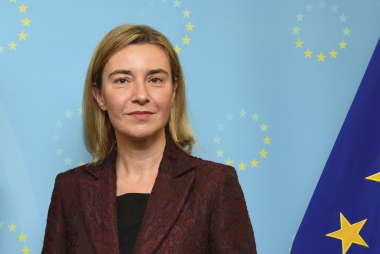This was a golden opportunity for the High Representative to publicly raise the EU’s concerns and finally be clear about the key role of human rights. Instead, she opted to add this occasion to the list of missed opportunities.
In remarks following her meeting with Foreign Minister Elmar Mammadyarov, Federica Mogherini announced an upgrade in relations between the EU and Azerbaijan and the intention to speed up negotiations on a new agreement without setting any preconditions. The High Representative made little mention of human rights, and her call to establish a new relationship of trust between the government and civil society sounds grotesque at a time when the majority of independent voices are either behind bars or in exile.
It is the role of the EU to support and revitalise Azerbaijani civil society, but holding a meeting with a few NGOs in the margins of the High Representative’s visit is not enough. As stated in the EU Strategic Framework and Action Plan on Human Rights and Democracy: “The EU will continue to throw its full weight behind advocates of liberty, democracy and human rights throughout the world.” What these brave men and women in Azerbaijan are seeing right now is exactly the opposite: the EU turning its back to them and sacrificing human rights in the country in the interest of a short-sighted move that will further alienate EU supporters in Azerbaijan.
HRHN is not only concerned by the EU’s decision to ignore the human rights crackdown in Azerbaijan during the High Representative’s visit. It is also deeply worried that the High Representative decided to meet with local civil society the day after discussing with the authorities, as this severely limited the chances that their testimonies would be considered during high-level talks. In their visit to third countries, EU leaders often meet with local civil society, and rightfully so. However, in those countries where human rights and their defenders are at risk, HRHN contends that it is key that these leaders get the possibility to use the strong messages of civil society representatives in their bilateral meetings with the authorities.
Ahead of the visit, a group of Brussels-based NGOs sent a letter to the High Representative to urge her to address, in both public and private, the EU’s concerns about the human rights situation in Azerbaijan. The letter read as follows:
“The EU has yet to impose serious consequences for the continued detention of dozens of government critics. We therefore urge you to demonstrate a strong, consistent policy response to the ongoing crackdown in Azerbaijan by putting on hold negotiations toward a Strategic Modernization Partnership Agreement until concrete steps are taken by the government of Azerbaijan to improve its abysmal human rights record, including the release of imprisoned activists, lawyers and journalists.”
It concludes: “We hope that your upcoming visit to Baku will send an unambiguous message that human rights are a key and non-negotiable priority in the EU’s engagement with Azerbaijan, and uphold the principles promoted by the EU’s own Strategic Framework for Human Rights and Democracy.”
On 24 February, just a few days before the High Representative embarked on her trip, the Supreme Court rejected the appeal of prominent human rights lawyer Intigam Aliyev, sentenced in April 2015 to seven and a half years in prison on politically motivated charges. This is just the last step of a human rights crackdown against civil society, media, lawyers, and political opposition that started in 2013, in connection with the deeply flawed presidential election. This crackdown saw its peak in 2014 during Azerbaijan’s Chairmanship of the Council of Europe.
HRHN has witnessed a weak and disorganised reaction by the EU to the situation in Azerbaijan, with a number of statements expressing concern but neither condemning the broad crackdown nor asking for the release of those unjustly imprisoned. The only principled response came from the European Parliament through its resolutions from September 2014 and 2015: unfortunately, its calls and condemnations were ignored both by Baku and by other EU institutions.
Since then, the EU’s opportunities to start a dialogue and confront the Azerbaijani authorities on the country’s dire human rights record have been rare. This is why the High Representative’s visit was seen by HRHN and other NGOs as a great opportunity to finally put human rights at the centre of the discussion, demanding the immediate and unconditional release of all those wrongfully imprisoned and the revocation of restrictive NGO legislation as a precondition to negotiating the Strategic Modernisation Partnership Agreement, but this was not to be, and negotiations continued without the human rights situation being publicly raised.
As underlined by the High Representative, the reviewed European Neighbourhood Policy (ENP) aims to differentiate between the diverse partner countries’ situations, agendas, and priorities, and, in this context, the EU wants to adopt tailor-made approaches. HRHN wonders what kind of message the EU is sending to its other partners in the neighbourhood when it rewards, with an improvement of bilateral relations, a country that puts its brightest minds in prison and prevents civil society from functioning? And how does the EU expect the crackdown in Azerbaijan to end? Is it not aware that its silence, combined with a willingness to deepen relations with the government, will only legitimise those responsible for the human rights abuses?
This missed opportunity should be seen in the context of a wider EU strategy of silence towards human rights in its neighbouthood.
Documents:





